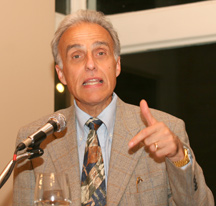 International authority and scholar on Islam John Esposito told the Wabash community Thursday night that Americans "must become better informed about Islam."
International authority and scholar on Islam John Esposito told the Wabash community Thursday night that Americans "must become better informed about Islam."
"We must be able to make informed judgments about Islam and about what the Qu'ran says," said the Brooklyn-born Esposito, founding director of The Center Muslim-Christian Understanding at Georgetown University, the author of more than 30 books on Islam, and the editor-in-chief of The Oxford Encyclopedia of the Modern Islamic World. "It is vital not only to our security, but to our economy, and to social justice in our country."
Speaking to the largest crowd of students, faculty, and staff ever to attend a Wabash Muslim Students Association dinner, Esposito said that the 9/11 attacks had been such a setback to understanding between the Muslim and Christian worlds that it will take another 20 years for it to "get back to where it needs to be."
The scuttling of the Dubai ports deal and the controversy over cartoons portraying the Prophet Muhammad as a terrorist are just two recent symptoms of that misunderstanding.
"For the past 30 years I've been talking with the media and government officials about Islam, and after 30 years I still get the same questions," Esposito said. "We lack sufficient knowledge of the Qu'ran and Islam to put events and issues into context."
That's not the case in the U.S. when it comes to Christianity or Judaism, Esposito explained.
"If you see an article about a right-wing extremist Christian group, you have a context for it, some sense or interpretation of what the Bible might say about it," the scholar said. "We know enough not to take that small group as representative of all of Christianity. But we don't have that sort of context for Islam yet.
"After 9/11, President Bush called the attacks the acts of Islamic extremists, not acts supported by all of Islam; but then Franklin Graham called Islam an evil religion," Esposito said. "How do we educate about both mainstream and extremist Islam when some see that very notion as being 'squishy liberal' or 'soft on Islam?' How do we educate when our very way of understanding Islam is being politicized?"
Esposito cited a recent Gallup Poll in which those in Muslim nations were asked, "What do you resent most about the United States?" The most common response was, "The denigration of Islam," followed closely by "Equating Islam with terrorism."
"The relationship of understanding between the Christian and Muslim worlds must move forward," Esposito said. "As educators, we must find ways to move it forward."